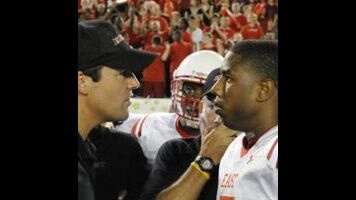Half rallying cry, half vow, the phrase "Texas forever" popped up in the first episode of Friday Night Lights shortly before the friendship of the three characters saying it–Street, Riggins, and Lyla–would be tested by mishap and infidelity. It returns this week as two of those characters say goodbye. The context has changed–Street is leaving Texas, maybe forever–but the meaning remains the same. These are people who will not forget the place that shaped them wherever they land.
They probably couldn't even if they tried. No doubt filming in New York stretched the show's budget, but getting to watch Riggins and Street in Manhattan is worth whatever they paid. Rather than go with cheap country mouse clichés, the show captured the experience of what it's like to hit the big city when you've grown up far from towering skylines. The guys seem equal parts thrilled and overwhelmed, unaware of proper cab etiquette but digging those long handicapped ramps. (And, in Riggins' case, revealing an unexpected appreciation for classic American musicals.)
Besides, a city kid would have known to be intimidated walking into a Manhattan sports agency and asking a job of an agent dressed in his best Patrick Bateman outfit. And maybe a city kid would have given up when the Bateman wannabe essentially laughed him out of the office instead of using the tiny bit of leverage he possessed to move all those Harvard grads out of his way and land a job.
Okay, let's just say this clearly: Street's storyline here is pretty implausible. Almost too-implausible-to-enjoy implausible. It's a convenient happy ending exit for Street arrived at by plot turns that seem only half thought-out by the show's grounded standards. Have we seen one iota of evidence that the smaller sports agency will be better for Wendell than the bigger one? Does Street do any research to insure he's not just working in his own best interest but in the interest of his client and committing the very offense he's accusing the competition of committing? (Frankly, the small firm seems a little sleazy, with an orthodontist-like reception area that doesn't inspire much confidence.) And yet I'm willing to forgive it if only for that final scene with Scott Porter acting his heart out, seeming to realize in mid-sentence just how much he needs his son and the mother of his child near him. The killing moment: When, after rehearsing what he needed to say over the course of what had to be an extremely expensive cab ride he realizes that he needs to hold his son before he can get another word out. Good luck, Scott Porter. And here's hoping we'll be seeing you around soon, though for some of us you'll always be Jason Street.
It's a great scene in another solid episode otherwise highlighted by Coach Taylor putting Saracen's to the test in his quest to get off the bench as receiver. There's, of course, more to it. Saracen has more to lose than most players should he fall short of Coach's expectations now that he's dating Julie. As usual, he passes, and he's starting to show a little more backbone than usual in his dealings with Coach.
Then again maybe, in spite of his need for some aspirin after the tryout, Coach was going easier on him, distracted by the creeping influence of the McCoy family. At home he has to deal with Tami's dream house aspirations, stoked in part by Katie McCoy's interest in local real estate. (And, no doubt, by the McCoy McMansion.) At work he finds himself taking on J.D.'s quarterback coach when illness sidelines the reliable Coach McGill. Later McGill will liken this to having a "fox in the henhouse," but really the McCoy influence seems more parasitic than predatory. The family has found a way to influence the principal, the Boosters, and the coaching staff itself without seeming to put much effort into it. And while they've done nothing wrong, exactly, Coach knows that there's nothing right about it either. Dillon is playing out on a small scale what happens when money and influence work their way into sports (or, really, anything) and the ideal of a meritocracy gets pushed aside in favor of those who know how to push. That J.D. actually earned his spot probably makes Coach resent the pushing that much more. (Chandler's brief exchange with D.W. Moffett said a lot without saying anything.)
Continuing the theme of those born without advantage having to work that much harder, let's take a moment to consider Tyra's situation before closing out the week. Distracted by Cash's imminent departure–and none-too-reassuring promise to try to be faithful–she blows her college interview. We don't see the interview itself, only the awkward moment when she delays it to take a call from Cash. From that moment on I thought it could go either way. Either she could be emboldened by Cash's sorry half-promise and nail the interview or be so flustered she presents herself poorly. Clearly, she doesn't come off well and ends the episode hitting the road to be a rodeo girlfriend, listening the mom-like voice in her head telling her to hold on to her man. Unlike Street, she's leaving, but, for now at least, heading only to the place already carved out for her. For some, "Texas forever" means forever staying where you started.
Grade: B

 Keep scrolling for more great stories.
Keep scrolling for more great stories.
